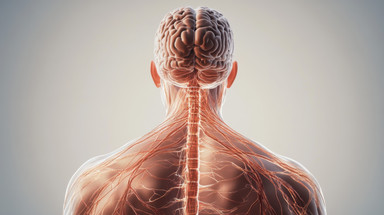Posted by Dee Cee Labs on Aug 29th 2025
Nutritional Support for Vagal Nerve Function and Parasympathetic Balance
The vagus nerve is one of the most important communication highways in the body, connecting the brain to organs like the heart, lungs, and digestive system. As the main driver of the parasympathetic nervous system—the body’s “rest and digest” mode—it plays a central role in calming stress responses, regulating heart rate, supporting digestion, and promoting recovery.
For chiropractic patients, vagal nerve function is especially important. A well-balanced parasympathetic system allows the body to relax after adjustments, enhances tissue healing, and reduces the chronic tension often linked to spinal misalignment. While chiropractic care directly influences nervous system function, nutrition also has a powerful effect on vagal tone and parasympathetic balance.
B vitamins for nerve signaling
B vitamins, particularly B12, B6, and folate, are essential for healthy nerve conduction and neurotransmitter synthesis. They help regulate the production of calming brain chemicals like serotonin and GABA, which improve vagal nerve activity and promote parasympathetic dominance. A deficiency in these vitamins can lead to poor nerve signaling, fatigue, and heightened stress responses.
Omega-3 fatty acids for nerve integrity
The vagus nerve, like all nerves, relies on healthy cell membranes for proper signaling. Omega-3 fatty acids (EPA and DHA) support the structure of nerve cells and reduce inflammation along neural pathways. Higher omega-3 intake has been linked to improved heart rate variability—a key marker of vagal tone and parasympathetic balance.
Magnesium for relaxation
Magnesium is known as the “calming mineral” because it helps regulate nerve impulses, reduce excitatory signaling, and relax smooth and skeletal muscles. By supporting GABA activity in the brain, magnesium promotes a state of relaxation that complements vagal nerve activation and improves overall parasympathetic balance.
Antioxidants for reduced oxidative stress
Oxidative stress can impair nerve function and contribute to chronic inflammation. Nutrients like vitamin C, vitamin E, and polyphenols (such as resveratrol and curcumin) help protect nerve tissues and support healthy signaling along the vagus nerve.
Final thoughts
For patients seeking to improve nervous system regulation and parasympathetic balance, nutrition is a vital piece of the puzzle. By emphasizing B vitamins, omega-3s, magnesium, and antioxidants, chiropractors can help patients strengthen vagal nerve function and support the restorative effects of care.

